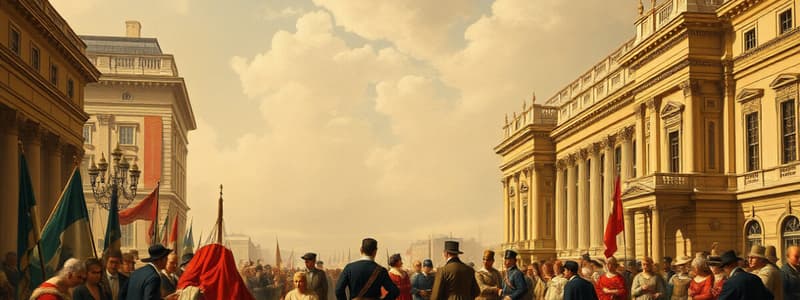Podcast
Questions and Answers
Who was the Frenchman Charles-Louis?
Who was the Frenchman Charles-Louis?
Montesquieu
What is one of Montesquieu's most famous contributions to political thinking?
What is one of Montesquieu's most famous contributions to political thinking?
The Spirit of Laws
What are the three branches of government outlined by Montesquieu?
What are the three branches of government outlined by Montesquieu?
Executive, Judicial, Legislative
What did Rousseau set out in 'The Social Contract'?
What did Rousseau set out in 'The Social Contract'?
Rousseau's political ideas were considered conservative for his time.
Rousseau's political ideas were considered conservative for his time.
Who was Denis Diderot?
Who was Denis Diderot?
What was the purpose of Diderot's 'Encyclopedia'?
What was the purpose of Diderot's 'Encyclopedia'?
Diderot's 'Encyclopedia' was fully supported by the church and the crown.
Diderot's 'Encyclopedia' was fully supported by the church and the crown.
What role did the Roman Catholic Church have in France?
What role did the Roman Catholic Church have in France?
How was the king able to rule France?
How was the king able to rule France?
What were parlements?
What were parlements?
What was the Estates General?
What was the Estates General?
Who was Voltaire?
Who was Voltaire?
What was the objective of the Enlightenment?
What was the objective of the Enlightenment?
Who was Jean-Jacques Rousseau?
Who was Jean-Jacques Rousseau?
Who was Montesquieu?
Who was Montesquieu?
Flashcards are hidden until you start studying
Study Notes
French Revolution Overview
- France was governed by a complex administrative system with varying jurisdictions and inconsistent rules, benefiting the wealthy elite.
- King Louis XVI claimed absolute authority but exercised limited control over distant regions, which often set their own taxation rates.
- Despite a unified monarchy, France had diverse languages and dialects, adding to its regional complexities.
- The Roman Catholic Church was the dominant religious institution, wealthy and politically powerful, with its clergy seen as the most important social group.
Role of the Roman Catholic Church
- The Church provided essential services such as education, healthcare, and charity, especially for impoverished populations.
- It owned about 10% of France's land and collected tithes, generating substantial revenue.
- The Church kept vital records (births, deaths, marriages) and played an administrative role, sometimes overseeing government decrees.
- Most subjects were legally Catholic, with severe restrictions on Protestants (approximately 550,000) and Jews (about 30,000), who faced discrimination and lacked civil rights.
Governance and the King's Authority
- Louis XVI relied on nobility and clergy to enforce his policies, creating a system that benefited them personally.
- French nobility purchased offices and sought to maintain the status quo for financial security, escaping the daily struggles faced by the common people.
- The Estates General, convened by the king during crises, was the representative body of France, consisting of the clergy (First Estate), nobility (Second Estate), and commoners (Third Estate).
Enlightenment Influence
- The Enlightenment emerged as writers and philosophers began to question existing societal structures and authority.
- Influenced by the earlier Scientific Revolution, Enlightenment thinkers sought to apply rationality and reason to governance and social issues.
- Writers faced censorship and exile, but their ideas spread, fostering greater literacy and public discourse, especially in salons and coffeehouses.
Key Enlightenment Figures
- Denis Diderot: Advocated for societal improvement through rational thought; criticized traditional governance.
- Voltaire (François-Marie Arouet): Critic of absolute monarchy; advocated for freedom of speech and religious tolerance; respected Britain's constitutional system.
- Jean-Jacques Rousseau: Proposed that legitimate government is based on the social contract and safeguarding citizens' rights; opposed societal norms that limited equality and freedom.
- Baron de Montesquieu: Introduced the separation of powers in government, promoting political liberties and influencing later political systems, including the U.S. Constitution.
Societal Conditions
- By the time Louis XVI took the throne, France faced widespread poverty coupled with the king's popularity rooted in the belief in the divine right of kings.
- Around one-third of the population was literate, but access to education and resources was unequal, contributing to growing unrest and the questioning of authority.
- The dichotomy of privilege for the elite versus struggles for the majority laid the groundwork for revolutionary fervor in France.### Rousseau and the General Will
- Emphasized the importance of the "general will" of the populace in political authority.
- Advocated that power must not be abused and should be derived from the general will, not divine right.
- Suggested mechanisms to ensure government power is checked by the will of the people.
Montesquieu's Perspective
- Asserted the idea that "power checks power" to prevent tyranny.
- Stressed that the king’s authority is legitimate only when aligned with the laws created by the general will.
Denis Diderot
- Lived from 1713 to 1784 and was instrumental in the Enlightenment movement.
- Co-authored the "Encyclopedia," aiming to compile and disseminate knowledge beyond mere summaries.
- Promoted rational understanding and critical thinking, particularly against the church and state authority.
- Despite suppression efforts by church and monarchy, nearly 25 volumes of the Encyclopedia circulated by 1789.
Rousseau's Social Contract
- Defined the sovereign's role as purely legislative, acting through laws reflecting the general will.
- Claimed that the Sovereign can only enact laws when the people are assembled, emphasizing participatory governance.
Studying That Suits You
Use AI to generate personalized quizzes and flashcards to suit your learning preferences.



